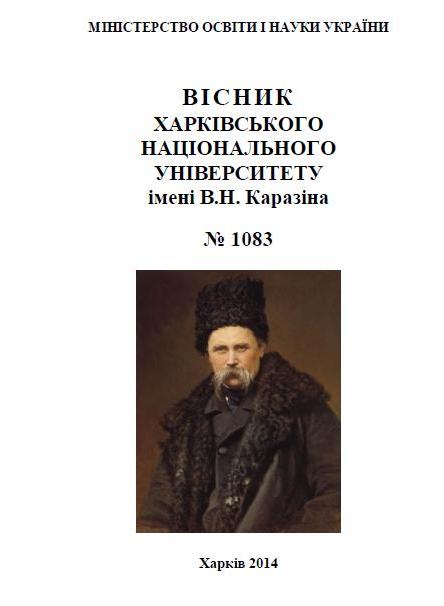БІБЛІЙНИЙ АНТРОПОЦЕНТРИЗМ ТА КОНЦЕПЦІЯ ВОЛОДАРЮВАННЯ ЛЮДИНИ В СВІТІ
Abstract
Статтю присвячено проблемі біблійного антропоцентризму: людину тут виокремлено з-
поміж інших земних істот. Але це породжує сьогодні звинувачення у піднесенні її як свавільного
«царя природи» й спроби покласти на Біблію відповідальність за сьогоднішні екологічні проблеми.
Слід розібратися у біблійній концепції людини та її відмінностях від ренесансного гуманізму, що
активно підживлювався паганістичною ідеєю теургії. Автор пропонує диференціювати
секулярний антропоцентризм, закорінений в антично-ренесансному світогляді й піднесений в
ідеях Модерну, та християнсько-теологічний антропоцентризм, зумовлений біблійним поглядом
на людину як на затьмарений гріхом образ Творця.
Ключові слова: теургія, ренесансний гуманізм, секулярний антропоцентризм,
християнсько-теологічний антропоцентризм.
Чікарькова М.Ю. Библейский антропоцентризм и концепция господства человека в
мире. Статья посвящена проблеме библейского антропоцентризма: человек здесь выделен из
прочих земных существ. Но это порождает сегодня обвинения в превознесении его как
своенравного «царя природы» и попытки возложить на Библию ответственность за
сегодняшние экологические проблемы. Следует разобраться в библейской концепции человека и ее
отличиях от ренессансного гуманизма, который активно подпитывался языческой идеей
теургии. Автор предлагает дифференцировать секулярный антропоцентризм, укорененный в
антично ренессансном мировоззрении и воплотившийся в идеях Модерна, и христианско-
теологический антропоцентризм, обусловленный библейским взглядом на человека как на
омраченный грехом образ Творца.
Ключевые слова: теургия, ренессансный гуманизм, секулярный антропоцентризм,
христианско-теологический антропоцентризм.
Mariya Chikarkova. Biblical anthropocentrism and the concept of the rule of man in the
world. The current global crisis of European culture is accompanied by a revival of interest in the
genesis of anthropocentric consciousness. It is worth to pay more attention to protophylosophical
systems, especially – to the biblical concept of reality and humanity. This paper addresses the problem of
biblical anthropocentrism: it is in the Bible, a man singled out from other earthly creatures. But today it
generates accusations against the Bible in the rise of man as arbitrary "King of Nature" and attempts to
impose on the Book of the books responsible for today's environmental problems. Therefore, you should
understand the biblical concept of man and his differences from the Renaissance humanism that actively
fuelled by paganism`s idea of magic. Just magic uniquely based on myth and elevates man as "Master of
Nature" that "dictates" the gods and demons, using magical the techniques and biblical religion aims at
understanding the knowledge of God and sets ethical standards, what was based primarily on rational
models. Analysis of the problem of human "independence" in the Bible and biblical antropodicy is
therefore extremely important – that the Bible was the first manifesto of consistent denial of arbitrary
infinite personality, moral indifference and moral relativism. Not-difference without magic and religion
in contemporary philosophical thought leads to confusion problem of anthropocentrism. The author
proposes to differentiate the anthropocentrism, rooted in the antique-Renaissance worldview and lifted up
in the ideas of Modern era, and Christian theological anthropocentrism, due to the biblical view of man
as marred by sin image of the Creator.
Keywords: Theurgy, Renaissance humanism, secular anthropocentrism, Christian theological
anthropocentrism.




